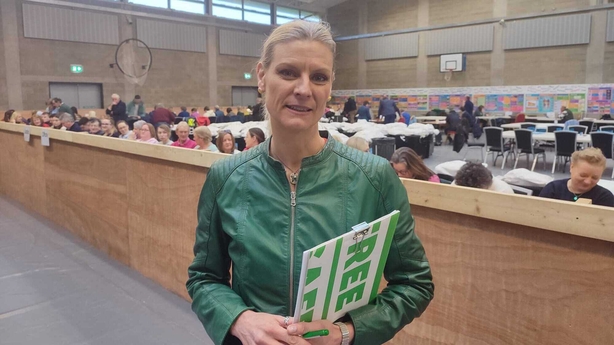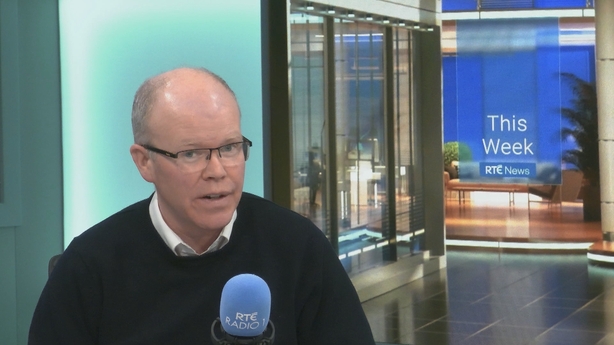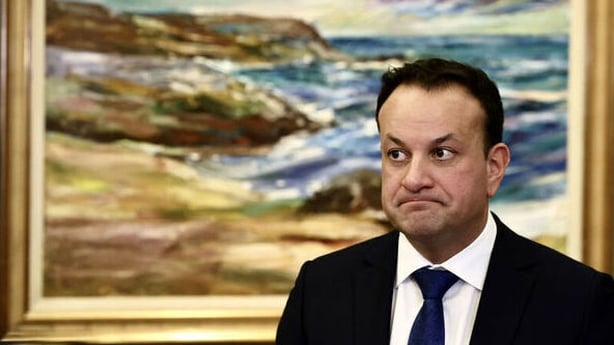Minister for Enterprise Simon Coveney has said the proposed amendments to the Constitution in the Family and Care referendums were soundly rejected in a clear, emphatic decision and the Government needs to take responsibility for the result.
Mr Coveney was speaking in Clonmel, Co Tipperary, where Fine Gael selected outgoing MEP Sean Kelly and businessman John Mullins to contest June's European elections for the party in the Ireland South constituency.
The coalition is now reflecting on what was the highest ever 'No' vote in any question put to the people.
Mr Coveney said the Government as a whole needed to accept the results, analyse them and be honest about what went wrong.
"We need to seriously assess what happened and fully understand why people voted the way they did," Mr Coveney said.
We need your consent to load this rte-player contentWe use rte-player to manage extra content that can set cookies on your device and collect data about your activity. Please review their details and accept them to load the content.Manage Preferences
He said he believed there were several different reasons why the proposed amendments were rejected as emphatically as they were, including that people did not like the propositions, others did not want to change the Constitution on the status of the family, and some felt they were not explained as comprehensively as they would have liked.
"When you add all those things together, that has resulted in one of the referendums going down by two to one, and the other going down by three to one. Those are big numbers," Mr Coveney said.
"I can assure you, we will look at that in a serious way now to ensure that we understand what people said and what motivated them to vote the way they did.
"I wouldn't say that we were out of touch with the electorate, but certainly the proposition that we put to people was soundly rejected and we have to understand why people made that decision."

'We maybe got the language wrong'
Earlier, Minister of State Pippa Hackett said the Government failed to articulate to the electorate why they should have voted 'Yes' in yesterday's dual referendums on Family and Care.
Speaking on RTÉ's The Week in Politics Ms Hackett, who sits at Cabinet as Minister of State for Land Use, said: "We failed to articulate to the electorate why they should vote Yes and Yes in the referendums".
Ms Hackett said that there are often difficulties when referendums concern values or morals, adding that the Government may have got the language around it wrong.
"It’s a complex issue and there were many reasons why people voted 'No’. We did maybe get the language wrong," she said.
"We need to listen directly to the concerns and we have had an opportunity to do that and hear that in the last week or so."
Minister of State Mary Butler said that voters were not confused and educated themselves, adding that it was obvious the Government's explanations did not meet the threshold of certainty for many people.
"It wasn't explained clearly enough and we need to take ownership of that," she said.
Speaking on RTÉ’s This Week programme, Ms Butler expressed disappointment that the constitution will exclude unmarried people from being a family, adding that single mothers were disappointed by this.
"The blame has to lie squarely with us as a Government that we didn’t do our job well enough," she said.

Aontú leader Peadar Toíbín said the referendums were a victory for democracy and a victory for the people against the political establishment in Ireland at present.
He said that Minister Mary Butler's claim that it was not explained properly was not the case.
"The reason it lost is because people did not agree with the amendments that were put to them," Mr Toíbín said.
"And I think it's a little bit patronising, and people say, well, we didn't explain that properly or the people didn't understand it properly.
"If a Government party has still that instinct, even at that stage, they're still not listening to the people and that's at the heart of the problem here politically."
Mr Toíbín said he agreed with the language in the Constitution being updated, but to include mothers and fathers, as they did not want to see mothers erased from the Constitution.
Speaking on The Week In Politics, Sinn Féin TD for Roscommon Galway Claire Kerrane said that her party "called it wrong" on the referendums, but added it was a Government referendum and not a Sinn Féin referendum.
"It was very rushed. I don't see why pre-legislative scrutiny wasn’t allowed in relation to this," she said.
Independent TD @MlMcNamaraTD and Green Party Senator @pippa_hackett speaking on the #Referendum.
— The Week in Politics (@rtetwip) March 10, 2024
🗣 Rebroadcast tonight at 22:00 on RTÉ News Channel and at 23:05 @RTEOne #RTETWIP pic.twitter.com/yGJczqIj6J
Ms Kerrane said that Sinn Féin wanted to widen the definition of family, and wanted to see care recognised in the constitution.
"The problem was the wording. As the campaign went on, questions were not answered. That was not the wording we would have chosen," she said, adding that there were lessons to be learned from the referendum.
Independent TD for Clare Michael McNamara said the referendums showed that Irish democracy was in a good state, but it cast a dim light on how the Dáil operates.
He said that he had no doubt that there were not more than 10 TDs in Dáil Eireann who did not want to campaign for a Yes Yes vote.
"The degree of control that the Government exercises over the Dáil is unusual compared to any other country in Europe. The parliament and the Government are two different institutions," he said.
He added that whips are used in "just about everything" and he didn’t think Sinn Féin would change that.
Mr McNamara said that there was no room for teasing anything out like legislation or wording, such as in referendum or other bills.

Taoiseach Leo Varadkar yesterday said he was one of a number of people who got it wrong and as head of Government he would accept responsibility.
Minister for Integration Roderic O'Gorman said he was extremely disappointed and would reflect on the campaign.
He told RTÉ's This Week programme that it is likely the leaking of advice from the attorney general on the wording of the referendums would be investigated.
This afternoon, Ms Hackett said that the leaking of legal advice from the Attorney General on the wording of the referendums did not come from her party.
"We have no idea where the leak came from," she said
"That isn't the way to do business to Government."
Read more:
Analysis: Government with questions to answer in referendum fallout
Additional reporting: Mary Regan





